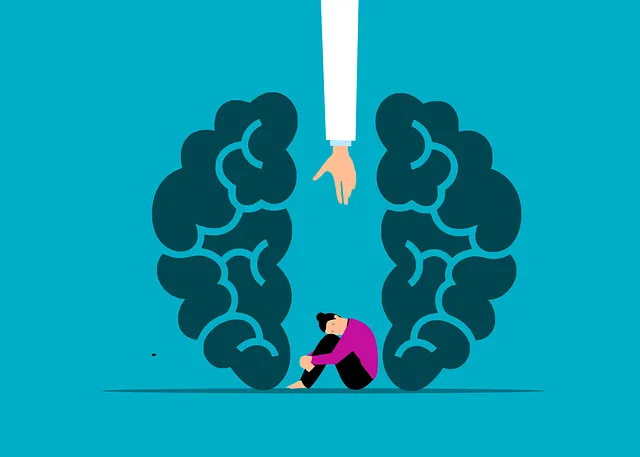Lone Tree Kaiser Permanente tackles mental illness stigma through comprehensive Lone Tree Kaiser Permanente mental health coverage, offering various therapy, medication management, and support programs. Their holistic approach promotes emotional healing and mental resilience, ensuring individuals have access to the necessary resources for their mental wellness journey. By funding evidence-based practices and emphasizing inner strength development, they revolutionize mental healthcare, influencing industry policies with their progressive strategy.
Mental illness stigma remains a significant barrier to seeking treatment, yet reduction efforts have gained momentum. This article explores comprehensive strategies to combat this pervasive issue. We delve into the profound impact of stigma on mental health and the crucial role healthcare providers play in fostering understanding. Community engagement and education are highlighted as powerful tools, along with policy changes and insurance coverage improvements exemplified by Lone Tree Kaiser Permanente’s innovative practices. By addressing these aspects, we aim to foster a more supportive environment for those facing mental health challenges.
- Understanding the Impact of Stigma on Mental Health
- The Role of Healthcare Providers in Reducing Stigma
- Community Engagement and Education Strategies
- Policy Changes and Insurance Coverage: A Case Study with Lone Tree Kaiser Permanente
Understanding the Impact of Stigma on Mental Health

Stigma surrounding mental illness can have severe consequences for individuals seeking support and treatment. The impact is multifaceted; it often leads to a barrier that prevents people from openly discussing their struggles, which in turn exacerbates feelings of isolation and self-stigmatization. This internalized shame can deter those affected from reaching out for help, leading to prolonged periods of suffering. According to research, the consequences of stigma include delayed access to care, reduced treatment adherence, and worse clinical outcomes.
At Lone Tree Kaiser Permanente, we recognize that mental health coverage is a crucial component in combatting stigma. By offering comprehensive mental wellness coaching programs and integrating conflict resolution techniques into patient care, we aim to foster an environment that promotes emotional healing processes. Through these initiatives, our goal is to reduce the impact of stigma, making it easier for individuals to prioritize their mental wellness and access the support they deserve.
The Role of Healthcare Providers in Reducing Stigma

Healthcare providers play a pivotal role in stigma reduction efforts for mental illness. They are often the first point of contact for individuals seeking support and have the unique opportunity to shape perceptions through direct interaction and education. By integrating empathetic communication, non-judgmental attitudes, and comprehensive care models, healthcare professionals can foster an environment that encourages open conversations about mental health. This approach normalizes discussions around mental illness, helping to dispel myths and stereotypes perpetuated by societal stigma.
At Lone Tree Kaiser Permanente, for instance, the focus on mental health coverage has been instrumental in promoting positive thinking and burnout prevention strategies. Through ongoing training and advocacy, healthcare providers are equipped with the knowledge and tools to address mental health concerns effectively while upholding ethical standards. By integrating these practices into routine care, they contribute significantly to a Mental Health Policy Analysis and Advocacy framework that challenges stigma at every level of interaction, paving the way for a more inclusive and supportive societal narrative.
Community Engagement and Education Strategies

Policy Changes and Insurance Coverage: A Case Study with Lone Tree Kaiser Permanente

Lone Tree Kaiser Permanente has been at the forefront of mental health coverage and stigma reduction, implementing policy changes that reflect a commitment to holistic patient care. They’ve expanded their insurance coverage to include a range of mental health services, ensuring accessibility for their members. This includes funding for evidence-based treatments, such as cognitive behavioral therapy, mindfulness practices, and stress management workshops offered by the organization Inner Strength Development.
By integrating these initiatives, Lone Tree Kaiser Permanente not only addresses the symptoms of mental illness but also focuses on inner strength development and confidence boosting through various programs. Their approach demonstrates a deep understanding that mental health is integral to overall well-being, paving the way for more progressive healthcare policies in the industry.
Mental illness stigma reduction is a multifaceted approach that involves healthcare providers, community engagement, education, and policy changes. As seen in the case study of Lone Tree Kaiser Permanente, improving mental health coverage can significantly mitigate stigma through increased awareness and support systems. By integrating these strategies, we can foster an environment where individuals feel empowered to seek help without fear of judgment, ultimately enhancing mental well-being for all.






